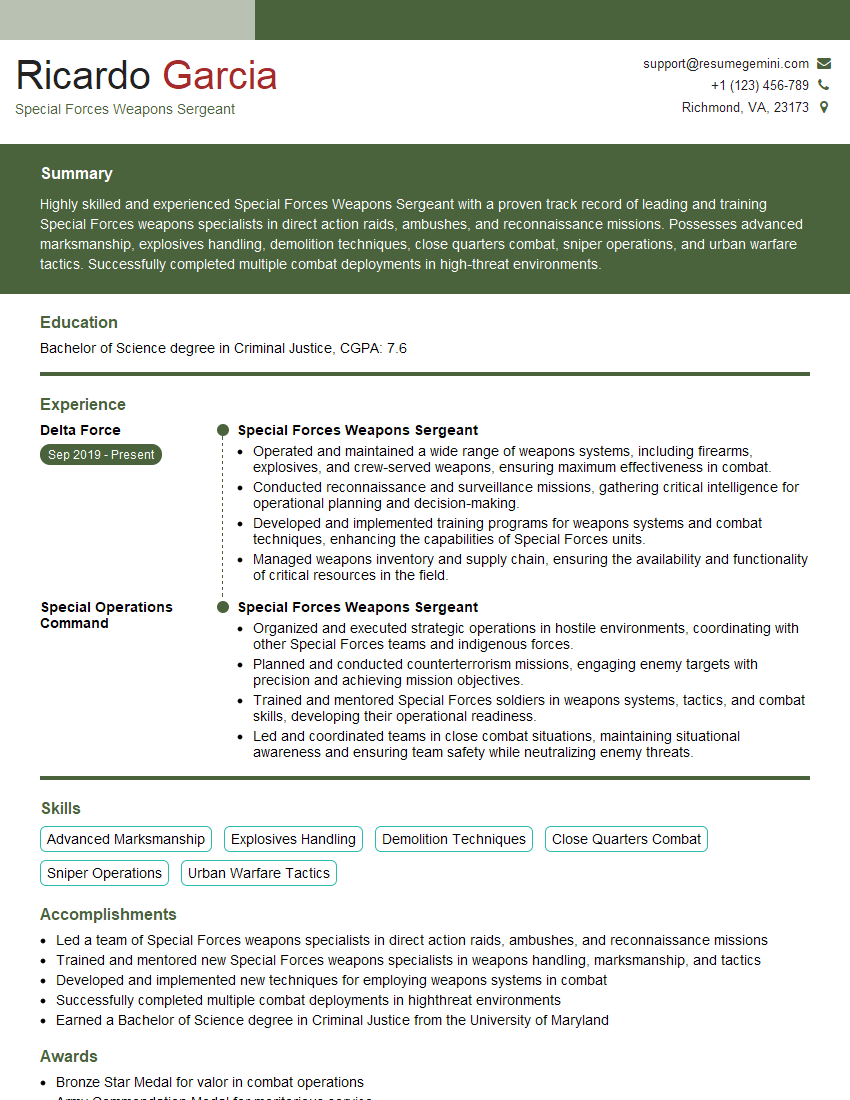Are you a seasoned Special Forces Weapons Sergeant seeking a new career path? Discover our professionally built Special Forces Weapons Sergeant Resume Template. This time-saving tool provides a solid foundation for your job search. Simply click “Edit Resume” to customize it with your unique experiences and achievements. Customize fonts and colors to match your personal style and increase your chances of landing your dream job. Explore more Resume Templates for additional options.

Ricardo Garcia
Special Forces Weapons Sergeant
Summary
Highly skilled and experienced Special Forces Weapons Sergeant with a proven track record of leading and training Special Forces weapons specialists in direct action raids, ambushes, and reconnaissance missions. Possesses advanced marksmanship, explosives handling, demolition techniques, close quarters combat, sniper operations, and urban warfare tactics. Successfully completed multiple combat deployments in high-threat environments.
Education
Bachelor of Science degree in Criminal Justice
August 2015
Skills
- Advanced Marksmanship
- Explosives Handling
- Demolition Techniques
- Close Quarters Combat
- Sniper Operations
- Urban Warfare Tactics
Work Experience
Special Forces Weapons Sergeant
- Operated and maintained a wide range of weapons systems, including firearms, explosives, and crew-served weapons, ensuring maximum effectiveness in combat.
- Conducted reconnaissance and surveillance missions, gathering critical intelligence for operational planning and decision-making.
- Developed and implemented training programs for weapons systems and combat techniques, enhancing the capabilities of Special Forces units.
- Managed weapons inventory and supply chain, ensuring the availability and functionality of critical resources in the field.
Special Forces Weapons Sergeant
- Organized and executed strategic operations in hostile environments, coordinating with other Special Forces teams and indigenous forces.
- Planned and conducted counterterrorism missions, engaging enemy targets with precision and achieving mission objectives.
- Trained and mentored Special Forces soldiers in weapons systems, tactics, and combat skills, developing their operational readiness.
- Led and coordinated teams in close combat situations, maintaining situational awareness and ensuring team safety while neutralizing enemy threats.
Accomplishments
- Led a team of Special Forces weapons specialists in direct action raids, ambushes, and reconnaissance missions
- Trained and mentored new Special Forces weapons specialists in weapons handling, marksmanship, and tactics
- Developed and implemented new techniques for employing weapons systems in combat
- Successfully completed multiple combat deployments in highthreat environments
- Earned a Bachelor of Science degree in Criminal Justice from the University of Maryland
Awards
- Bronze Star Medal for valor in combat operations
- Army Commendation Medal for meritorious service
- Army Achievement Medal for outstanding performance
- Special Forces Tab for completion of Special Forces Qualification Course
Certificates
- US Army Ranger School
- US Army Special Forces Qualification Course
- US Army Airborne School
- US Army Air Assault School
Career Expert Tips:
- Select the ideal resume template to showcase your professional experience effectively.
- Master the art of resume writing to highlight your unique qualifications and achievements.
- Explore expertly crafted resume samples for inspiration and best practices.
- Build your best resume for free this new year with ResumeGemini. Enjoy exclusive discounts on ATS optimized resume templates.
How To Write Resume For Special Forces Weapons Sergeant
- Highlight your combat experience and leadership skills.
- Quantify your accomplishments whenever possible.
- Use action verbs to describe your responsibilities.
- Tailor your resume to the specific job you are applying for.
Essential Experience Highlights for a Strong Special Forces Weapons Sergeant Resume
- Lead and manage a team of Special Forces weapons specialists in combat operations
- Train and mentor new Special Forces weapons specialists in weapons handling, marksmanship, and tactics
- Develop and implement new techniques for employing weapons systems in combat
- Plan and execute combat operations, including direct action raids, ambushes, and reconnaissance missions
- Provide weapons and tactical support to other Special Forces units
- Maintain and inspect weapons and equipment to ensure mission readiness
Frequently Asked Questions (FAQ’s) For Special Forces Weapons Sergeant
What are the duties of a Special Forces Weapons Sergeant?
Special Forces Weapons Sergeants are responsible for leading and training a team of Special Forces weapons specialists. They must be able to plan and execute combat operations, including direct action raids, ambushes, and reconnaissance missions. They must also be proficient in a variety of weapons systems and tactics.
What are the qualifications for becoming a Special Forces Weapons Sergeant?
To become a Special Forces Weapons Sergeant, you must have at least three years of experience as a Special Forces weapons specialist. You must also have a strong leadership record and be proficient in a variety of weapons systems and tactics.
What is the training like for Special Forces Weapons Sergeants?
Special Forces Weapons Sergeants receive extensive training in a variety of weapons systems and tactics. They also receive training in leadership and combat operations.
What is the career outlook for Special Forces Weapons Sergeants?
The career outlook for Special Forces Weapons Sergeants is good. There is a high demand for qualified Special Forces personnel, and the job is considered to be a rewarding and challenging career.
What are the benefits of being a Special Forces Weapons Sergeant?
Special Forces Weapons Sergeants receive a variety of benefits, including: competitive pay, health insurance, retirement benefits, and the opportunity to serve their country.
What are the challenges of being a Special Forces Weapons Sergeant?
Special Forces Weapons Sergeants face a variety of challenges, including: long deployments, high-risk combat operations, and the possibility of injury or death.